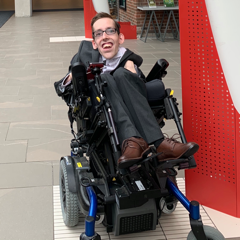
Devin Glim
Law students wear many hats, and at Osgoode, many students also wear the hat of being community organizers. I had the honour of interviewing 12 JD students about their involvement in various social justice movements and community initiatives this past year. Here is an overview of their work.
Devin Glim (1L) is an activist in the disability justice movement. He highlighted his work with the Disability Justice Network of Ontario (DJNO), whose commitment is “to create a world where people with disabilities are free to be.”
Devin began his work with DJNO shortly after its creation, and he has taken up its “many opportunities to build community within the disabled population, while also working towards creating tangible changes to public policy.”
He explained that, having been politically active as a student advocate during his undergraduate studies, he “needed to find a way to continue to contribute to the social movements that were taking place.”
“As a physically disabled person myself, the disability justice movement felt like a natural fit for me. I felt it was a movement that would not only impact my personal life, but that it would also create positive change throughout local communities.”
“The fact that DJNO was new,” Devin said, meant that it was “an exciting opportunity to get involved and help shape the projects that the organization would take on.”
Devin commented on ways in which DJNO responds to injustice. “Historically, people with disabilities have often been left unheard, with many of the barriers barring individuals with disabilities from being free to be still in existence today. DJNO, as well as the entire disability justice movement as a whole, aims to provide a voice for a community that has often gone unheard. However, it is also a priority to empower people with disabilities to be their own voice, and to have the political agency to fight for the change that they themselves want to see.”
Reflecting on his career path, Devin described the relationship between his community activism and law school experiences as “a two-way street.” “I originally decided to go into law because of my advocacy work. It seemed to me to be the best way to further create change and ensure that people with disabilities had a voice within the systems and structures that were not built with us in mind. For that reason, I fully believed that I would go on to focus on disability, human rights, and health law. However, as I went through this year, I began to realize that my passions may lie in a different direction.”
“This change in direction was challenging in that I was worried about letting down the communities I was involved with. That being said, what I have learned from my activism is that there is no one way to do it. It does not matter what areas of law I focus on as I will always work to ensure that disability justice advocacy remains a large part of both my legal career and personal life.”
Devin highlighted the importance of collective action: “The disability justice movement is unique in that most people at some point will be affected by disability, either invisible, or physical, or both. By coming together and ensuring that barriers preventing people with disabilities from being truly free are removed, it will only make the future better for everyone.”
